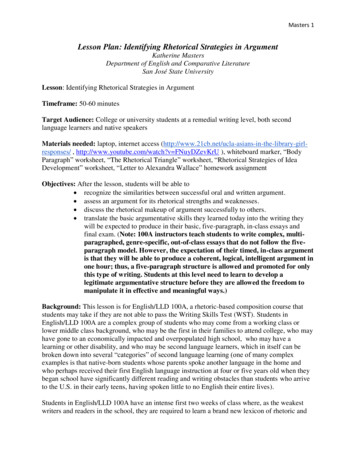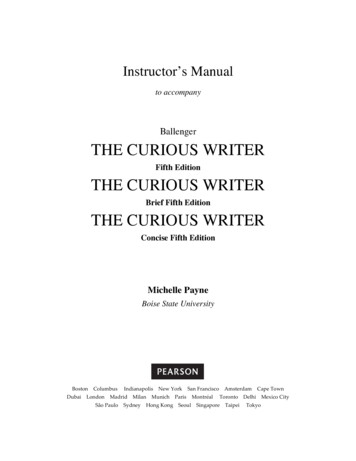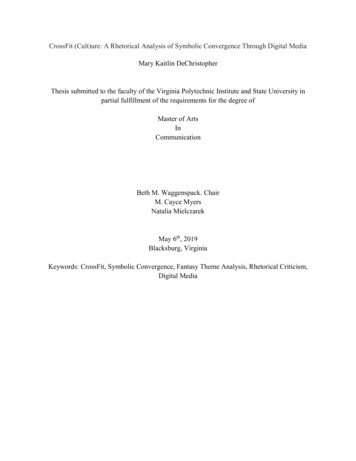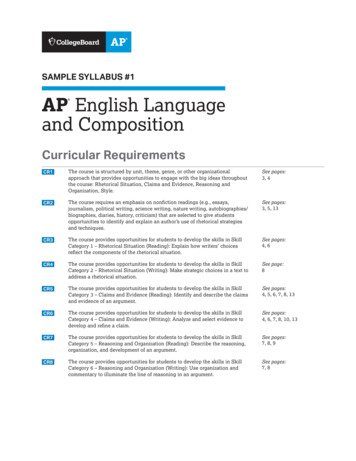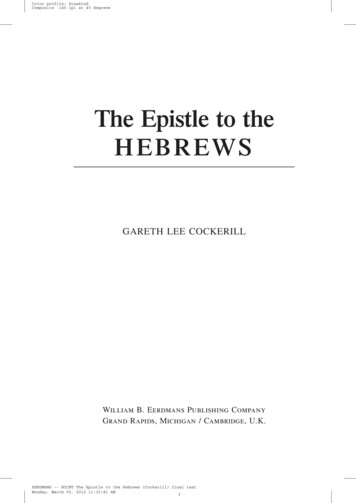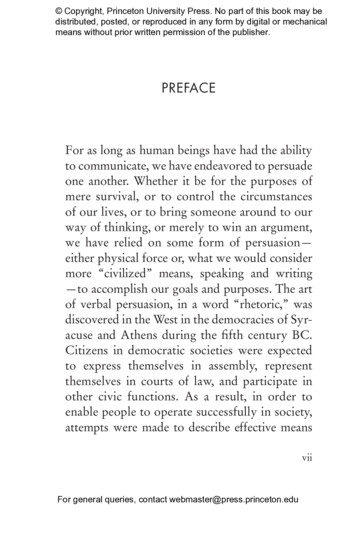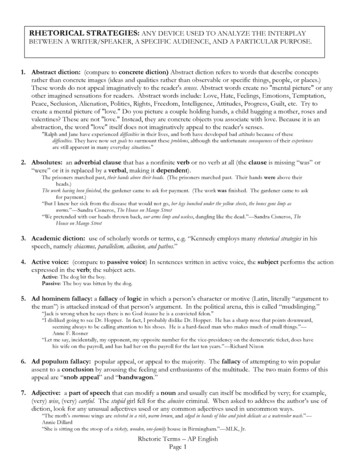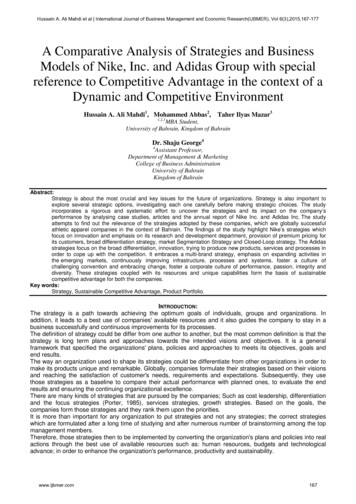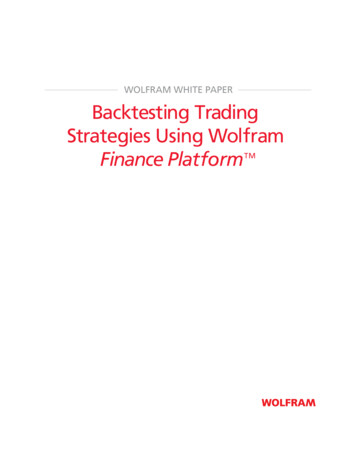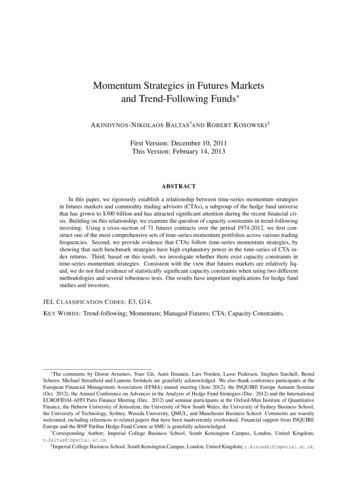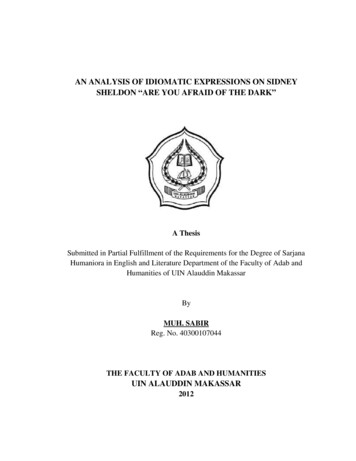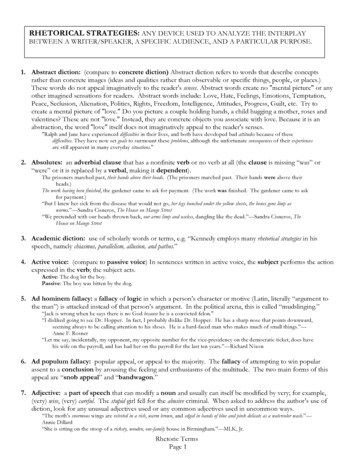
Transcription
RHETORICAL STRATEGIES: ANY DEVICE USED TO ANALYZE THE INTERPLAYBETWEEN A WRITER/SPEAKER, A SPECIFIC AUDIENCE, AND A PARTICULAR PURPOSE.1. Abstract diction: (compare to concrete diction) Abstract diction refers to words that describe conceptsrather than concrete images (ideas and qualities rather than observable or specific things, people, or places.)These words do not appeal imaginatively to the reader's senses. Abstract words create no "mental picture" or anyother imagined sensations for readers. Abstract words include: Love, Hate, Feelings, Emotions, Temptation,Peace, Seclusion, Alienation, Politics, Rights, Freedom, Intelligence, Attitudes, Progress, Guilt, etc. Try tocreate a mental picture of "love." Do you picture a couple holding hands, a child hugging a mother, roses andvalentines? These are not "love." Instead, they are concrete objects you associate with love. Because it is anabstraction, the word "love" itself does not imaginatively appeal to the reader's senses."Ralph and Jane have experienced difficulties in their lives, and both have developed bad attitudes because of thesedifficulties. They have now set goals to surmount these problems, although the unfortunate consequences of their experiencesare still apparent in many everyday situations."2. Absolutes: an adverbial clause that has a nonfinite verb or no verb at all (the clause is missing “was” or“were” or it is replaced by a verbal, making it dependent).The prisoners marched past, their hands above their heads. (The prisoners marched past. Their hands were above theirheads.)The work having been finished, the gardener came to ask for payment. (The work was finished. The gardener came to askfor payment.)“But I knew her sick from the disease that would not go, her legs bunched under the yellow sheets, the bones gone limp asworms.”—Sandra Cisneros, The House on Mango Street“We pretended with our heads thrown back, our arms limp and useless, dangling like the dead.”—Sandra Cisneros, TheHouse on Mango Street3. Academic diction: use of scholarly words or terms, e.g. “Kennedy employs many rhetorical strategies in hisspeech, namely chiasmus, parallelism, allusion, and pathos.”4. Active voice: (compare to passive voice) In sentences written in active voice, the subject performs the actionexpressed in the verb; the subject acts.Active: The dog bit the boy.Passive: The boy was bitten by the dog.5. Ad hominem fallacy: a fallacy of logic in which a person’s character or motive (Latin, literally “argument tothe man”) is attacked instead of that person’s argument. In the political arena, this is called “mudslinging.”“Jack is wrong when he says there is no God because he is a convicted felon."“I disliked going to see Dr. Hopper. In fact, I probably dislike Dr. Hopper. He has a sharp nose that points downward,seeming always to be calling attention to his shoes. He is a hard-faced man who makes much of small things.”—Anne F. Rosner“Let me say, incidentally, my opponent, my opposite number for the vice-presidency on the democratic ticket, does havehis wife on the payroll, and has had her on the payroll for the last ten years.”—Richard Nixon6. Ad populum fallacy: popular appeal, or appeal to the majority. The fallacy of attempting to win popularassent to a conclusion by arousing the feeling and enthusiasms of the multitude. The two main forms of thisappeal are “snob appeal” and “bandwagon.”7. Adjective: a part of speech that can modify a noun and usually can itself be modified by very; for example,(very) wise, (very) careful. The stupid girl fell for the abusive criminal. When asked to address the author’s use ofdiction, look for any unusual adjectives used or any common adjectives used in uncommon ways.“The moth’s enormous wings are velveted in a rich, warm brown, and edged in bands of blue and pink delicate as a watercolor wash.”—Annie Dillard“She is sitting on the stoop of a rickety, wooden, one-family house in Birmingham.”—MLK, Jr.Rhetoric TermsPage 1
8. Adjective phrase: see phrase9. Adverb: a part of speech usually ending in –ly that is used chiefly as a modifier of an adjective (She is extremelypale.), a modifier of another adverb (The storm came very suddenly.), or as an adverbial (I visit my familyfrequently).10. Adverb phrase: see phrase11. Adverbial: a sentence element used to convey a range of information about the situation depicted in the basicsentence structure (how, when, where, to what extent, or under what conditions).Vietnamese veterans were demonstrating noisily outside the White House. (both “noisily” and “outside the White House” areadverbials.I entirely agree.Unfortunately, no cure exists.A reliable witness has testified tat they were in Denver on the day they claimed to be in Houston. They are therefore lying.For all its weaknesses the Continental Congress had won the war against one of the world’s mightiest powers.Jade is plentiful in this area.A few days ago a new mayor was elected in New York.12. Adverbial clause: a clause that has an adverb-like function in modifying another clause.I saw the movie before I left to Europe.If a heart attack occurs, the electronic device automatically orders charges of electricity to jolt the heart back into a normalrhythm.Reflecting on the past three years, she wondered whether she could have made better choices.When in Rome, do as the Romans do.13. Adverbial complement: see complement.14. Allegory: an extended narrative in prose or verse in which characters, events, and settings represent abstractqualities and in which the author intends a second meaning to be read beneath the surface of the story; theunderlying meaning may be moral, religious, political, social, or satiric. on one side of the portal, and rooted almost at the threshold, was a wild rose-bush, covered, in this month of June,with its delicate gems, which might be imagined to offer their fragrance and fragile beauty to the prisoner as he wentin, and to the condemned criminal as he came forth to his doom, in token that the deep heart of Nature could pityand be kind to him. This rose-bush, by a strange chance, has been kept alive in history; but whether it had merelysurvived out of the stern old wilderness, so long after the fall of the gigantic pines and oaks that originallyovershadowed it, or whether, as there is fair authority for believing, it had sprung up under the footsteps of thesainted Ann Hutchinson, as she entered the prison-door, we shall not take upon us to determine. Finding it sodirectly on the threshold of our narrative, which is now about to issue from that inauspicious portal, we couldhardly do otherwise than pluck one of its flowers and present it to the reader. It may serve, let us hope, to symbolizesome sweet moral blossom, that may be found along the track, or relieve the darkening close of a tale of humanfrailty and sorrow."—Nathaniel Hawthorne, The Scarlet Letter15. Alliteration: repetition of consonant sounds at the beginning of words that are close to one another:Peter Piper picked a peck of pickled peppers.“Freak of fancy in my friend.”—Edgar Allen Poe“Fish, fowl, flesh, roasted in luscious stews, and seasoned, I trust, to all your tastes.”—Nathaniel Hawthorne16. Allusion: a brief or indirect reference to a person, place, event, or passage in a work of literature or the Bibleassumed to be sufficiently well known to be recognized by the reader. Allusions add depth and universalsignificance to a passage.“I am Lazarus, come from the dead.”—T.S. Eliot (referencing Christ’s raising of Lazarus from the dead in the NewTestament)“What can be more moving than a wise, high-strung woman begging a child’s forgiveness, even as King Lear knelt toCordelia for Pardon.”—Helen Keller (referencing Shakespeare’s King Lear asking his only faithful daughter who hadbeen cast out for forgiveness)“ the younger crows for who I now felt a contempt such as only a disillusioned dreamer feels for those still unawarethat they dream—the business students from southern colleges for whom business was vague, an abstract gameRhetoric TermsPage 2
with rules as obsolete as Noah’s Ark, but who yet were drunk on finance.”—Ralph Ellison, The Invisible Man(referencing Noah’s story from the Old testament)“There were occasions, I believed, when a nation was justified in using military force to achieve its ends, to stop a Hitler orsome comparable evil, and I told myself that in such circumstances I would’ve willingly marched off to battle.”— TimO’ Brien, The Things They Carried (referencing Adolf Hitler, fascist dictator responsible for the deaths of millions)“Remember that I am they creature; I ought to be thy Adam, but I am rather the fallen angel, whom thou drivest from joy forno misdeed.”—Mary Shelley, Frankenstein (referencing the biblical creation story)17. Ambiguity: the expression of an idea in such a way that more than one meaning is suggested. A text that isrich in patterns of imagery, symbolism, and multiple meanings (created through suggestive, connotativelanguage) is said to be a layered text and filled with ambiguity. Note: All AP passages have some ambiguity. To get the highestscores, students have to make reference to the multiple meanings seen in the passages.18. Anadiplosis: the repetition of the last word of one clause at the beginning of the next clause:I lift up mine eyes unto the hills, from whence cometh my help. My help cometh from the Lord which made heaven andearth. Psalms 121:1Death, as the Psalmist saith, is certain to all: all shall die.—Shakespeare, Henry IV part 2My conscience hath a thousand several tongues,/ And every tongue brings in a several tale,/ And every tale condemns mefor a villain.—Shakespeare, Richard III19. Analogy: a comparison between two things in which the more complex is explained in terms of the moresimple.“Last year’s profile of the stock index looks like a roller-coaster ride at your local amusement park.”“The dominant race is to be deprived of its superiority; nor is a tigress robbed of its cubs more furious than is the Boer at thisprospect.”—Winston Churchill20. Anaphora: the repetition of introductory words or phrases for effect. This creates a rhythm and establishes apattern, giving the reader a contextual framework for understanding the ideas.“And so, let freedom ring from the prodigious hilltops of New Hampshire. Let freedom ring from the mighty mountains ofNew York. Let freedom ring from the heightening Alleghenies of Pennsylvania. Let freedom ring from the snowcappedmountains of Colorado. Let freedom ring from the curvaceous peaks of California ”—Martin Luther King, Jr, “IHave a Dream”“I hated Boy Scouts. I hated camping out. I hated dirt and tents and mosquitoes.”—Tim O’ Brien, The Things They Carried“I would have not married the other man. I would not have become the kind of wife who prayed for the Japanese would killher husband. I would not have become the kind of mother who could not grieve when her children died.”—AmyTan, The Kitchen God’s Wife“Four skinny trees with skinny necks and pointy elbows like mine. Four who do not belong here but are here. Four raggedyexcuses planted by the city.”—Sandra Cisneros, The House on Mango Street21. Anastrophe: departure from normal word order for the sake of emphasis. Normal syntax is violated. The verb before the subject-noun (normal syntax follows the order subject-noun verb)“Glistens the dew upon the morning grass.” (Normal: The dew glistens upon the morning grass.) Adjectives which follow the noun they modify instead of preceding it. This causes the reader to pause andpay more careful attention to these descriptive words.“Her hands, old and wrinkled, stroke her dying husband’s face.” (Normal: Her old and wrinkled hands stroke her dyinghusband’s face.)“She looked at the sky dark and menacing.” (Normal: She looked at the dark and menacing sky.)“Not one of them was an obvious subject for a shower, and yet—hair, much too long, tangled here and there, knottedround a dead leaf or a twig; faces cleaned fairly well by the process of eating and sweating but marked in the lessaccessible angles with a kind of shadow; clothes, worn away, stiff like his own with sweat, put on, not for decorum orcomfort but out of custom; the skin of the body, scurfy with brine—“—William Golding, Lord of the Flies“But what you might remember most is this tree, huge, with fat arms and mighty families of squirrels in the higherbranches.”—Sandra Cisneros, The House on Mango Street“It was that kind of crazy afternoon, terrifically cold, and no sun out or anything, and you felt like you were disappearingevery time you crossed a road.”—J.D. Salinger, The Catcher in the Rye The object preceding its verb (normal syntax is verb followed by its object) Preposition following the object of the preposition (normal syntax is preposition, object)“Troubles, everybody’s got.” (Normal: Everybody’s got troubles.)Rhetoric TermsPage 3
“It only stands/Our lives upon, to use Our strongest hands.”—Shakespeare, Antony and Cleopatra (Normal: It onlystands/upon Our lives, to use Our strongest hands.”)22. Anecdote: a short entertaining account of some happening, frequently personal or biographical used to bringhumor or to illustrate a particular characteristic or trait.Bill Gates' computer-geek image was established well before his days at Microsoft. Steven Ballmer, a college buddy wholater became the company's president, recalled that Gates never put sheets on his bed and once left for vacation inthe middle of a thunderstorm - with the windows and door to his room wide open.” [As a student at Harvard,Gates frequently played poker until daybreak. He did not graduate.]23. Annotation: Explanatory notes added to a text to explain, cite sources, or give bibliographical data.24. Anticipating and addressing counter-arguments: When making the argument, the author, aware of whatpoints his or her opponents will likely take exception to, anticipates these objections and then addresses them inhis or her argument, thus strengthening his or her position. Refutation and concession are examples of thistype of organizational strategy.Mr. Hammond, I am writing to you because you have handled our account on many occasions. While I realize your salesrepresentative is new, I feel she misrepresented the quality of the Z690s. I also feel that she has been unhelpful inaddressing my claim. (concession)25. Antithesis: opposition or contrast emphasized by parallel structure.“I have a dream that one day even the state of Mississippi, a desert state sweltering with the injustice and oppression, will betransformed into an oasis of freedom and justice.”—MLK, Jr.“A man desires the satisfaction of his desires; a woman desires the condition of desiring.”—Pam Houston“They were, in fact and at last free. And the lives of these old black women were synthesized in their eyes—a puree oftragedy and humor, wickedness and serenity, truth and fantasy.”—Toni Morrison, The Bluest Eye“The mark of the immature man is that he wants to die nobly for a cause, while the mark of the mature man is that he wantsto live humbly for one.”—J.D. Salinger, The Catcher in the Rye26.Antecedent: the word for which a pronoun stands.“Answers successfully arrived at are solutions to difficulties previously discussed and one cannot untie a knot if he isignorant of it.”—Aristotle27. Aphorism: a brief saying embodying a moral; a concise statement of a principle or precept given in pointedwords.“Imitation is suicide.”—Ralph Waldo Emerson“A man is God in ruins.”—Ralph Waldo Emerson28. Apostrophe: a strategy in which an absent person, inanimate object (the sun, for example), or abstract being(Death) is addressed directly.“Death be not proud, though some have called thee/ Mighty and dreadful.” –John Donne“I nod to death in passing, aware of the sound of my own feet upon my path.”—Peter Mathiesson“Our house stood within a few rods of the Chesapeake Bay, whose broad bosom was ever white with sails from everyquarter of the habitable globe. Those beautiful vessels, robed in purest white, so delightful to the eye of freemen, wereto me so many shrouded ghosts, to terrify and torment me with thoughts of my wretched condition. I have often, in thedeep stillness of a summer’s Sabbath, stood all alone upon the lofty banks of that noble bay, and traced, with saddenedheart and tearful eye, the countless number of sails moving off to the mighty ocean. The sight of these always affectedme powerfully. My thoughts would compel utterance; and there, with no audience but the Almighty, I would pour outmy soul’s complaint, in my rude way, with an apostrophe to the moving multitude of ships.—You are loosed from your moorings, and are free; I am fast in my chains, and am a slave! You move merrily before the gentle gale, and I sadly beforethe bloody whip! You are freedom’s swift-winged angels, that fly round the world; I am confined in bands of iron1 O that I were free! O, thatI were on one of your gallant decks, and under your protecting wing!.”—Frederick Douglass29. Appeal to authority/expert testimony: citation of information from people recognized for their specialknowledge of a subject for the purpose of strengthening an author’s arguments. As the notorious Mick Jaggersays, “You can’t always get what you want.”30. Appositive: a noun phrase or clause which renames or describes another noun phrase or pronoun.Rhetoric TermsPage 4
We visited the home of Harriet Beecher Stowe, the author of Uncle Tom’s Cabin.“But they also felt a kind of giddiness, a secret joy, because they were alive .”—Tim O’ Brien, The Things They Carried“The special kids, the ones who wear keys around their necks, get to eat in the canteen.”—Sandra Cisneros, The House on MangoStreet“I never knew how sick she was until that day I tried to show her one of the pictures in the book, a beautiful color picture of the waterbabies swimming in the sea.”—Sandra Cisneros, The House on Mango Street31. Argument: the logical (facts, statistics, hard evidence, etc.) and non-logical ideas or reasons a person uses toconvince a specific audience.I am a member of a party of one, and I live in an age of fear. Nothing lately has unsettled my party and raised my fearsso much as your editorial, on Thanksgiving Day, suggesting that employees should be required to state their beliefsin order to hold their jobs. The idea is inconsistent with our Constitutional theory and ahs been stubbornly opposed by watchfulmen since the early days of the Republic.—E.B. White32. Argumentation: writing that attempts to prove the validity of a proposition or an idea by presenting reasonedarguments; persuasive writing is a form of argumentation.33. Aristotelian Concession: see concession.34. Aristotelian logic: a formal logical system using syllogism in which propositions are given to support aconclusion that can be proven either by deduction or induction.1.2.3.All penguins are birds.No birds are mammals.Therefore, no penguins are mammals.35. Assertion: the starting point of an argument; the rhetorical stance; a general statement of belief orjudgment that can be supported with specific evidence and examples: The death penalty is a form of legalizedmurder. A “for or against” stance is also called a proposition.“Racists and segregationists use the press skillfully to project an image of the Black man as criminal.”—Malcolm X“Trust is a fundamental requirement for our kind of existence, and without it our linkages would begin to snap loose.”—Lewis Thomas“The honest book-keeper, the faithful wife, the earnest scholar get little attention compared to the embezzler, the tramp,the cheat.”—John Steinbeck“Everything in the world must have design or the human mind rejects it.”—John Steinbeck36. Assonance: repetition of vowel sounds between different consonants; e.g. Early in the day, the neighs began tofade.37. Assumption: an inference or conclusion, possibly based on some evidence. “She is a successful American,which is to say, an American.”—Joyce Carol Oates38. Asyndeton: Commas used (with no conjunction) to separate a series of words. The parts are emphasizedequally when the conjunction is omitted; in addition, the use of commas with no intervening conjunctionspeeds up the flow of the sentence. This is a form of parallelism.“And now abideth faith, hope, charity, these three; but the greatest of these is charity.” 1 Cor 13:13“Like Dave, he asked nothing, gave nothing, expected nothing ”—Jack London“Give up money, give up fame, give up science, give up the earth itself and all it contains rather than do an immoral act.”—Thomas Jefferson“I did not want to die. Not ever. But certainly not then, not there, not in a wrong war.”— Tim O’ Brien, The Things They Carried39. Audience: The group of readers or listeners to whom this piece is directed.40. Balanced sentence structure: a sentence that has parallel phrases or clauses used to stress similar ideas:“Together let us explore the stars, conquer the deserts, eradicate disease, tap the ocean depths, and encourage the arts and commerce.”—JFK“The corners heap up with poetry; whole unfilled systems litter the ice.”—Annie Dillard41. Bandwagon: either saying that supporting a specific cause/stance would result in the rejection of peers orusing the popular support of a cause/stance to persuade others to support it as well:Rhetoric TermsPage 5
Everyone who goes to those parties drinks.If you don’t drink, no one will invite you to anything.42. Begging the question: fallacy of logical argument that assumes the reader will automatically accept anassertion without proper support.“Lying is universal, we all do it; we must all do it. Therefore, the wise thing is for us to diligently train ourselves to liethoughtfully, judiciously.”—Mark Twain43. Binary classification: the task of classifying the members of a given set of objects into two groups on the basisof whether they have some property or not. Some typical binary classification tasks are medical testing to determine if a patient has certain disease or not (the classification property is the disease)quality control in factories; i.e., deciding if a new product is good enough to be sold, or if it should be discarded (theclassification property is being good enough)deciding whether a page or an article should be in the result set of a search or not (the classification property is the relevanceof the article - typically the presence of a certain word in it)32. Cacophony: harsh, awkward, or dissonant sounds used deliberately in poetry or prose; the opposite ofeuphony:“The powers of prunes are prudent to provide potent pallitive prophylaxis of potential pooper problems, priming you forpurging. “—Rob BohnenbergerPlayer PianoMy stick fingers click with a snickerAnd, chuckling, they knuckle the keys;Light footed, my steel feelers flickerAnd pluck from these keys melodies.My paper can caper; abandonIs broadcast by dint of my din,And no man or band has a hand inThe tones I turn on from within.At times I'm a jumble of rumbles,At others I'm light like the moon,But never my numb plunker fumbles,Misstrums me, or tries a new tune.-John Updike-33. Caricature: descriptive writing that greatly exaggerates a specific feature of a person’s appearance or a facet ofpersonality; used for comic effect or criticism:“One was a woman in a slim black dress, belted small under the armpits, with bulges like a cabbage in the middle of thesleeves, and a large black scoop-shovel bonnet with a black veil, and white slim ankles crossed about with blacktape, and very wee black slippers, like a chisel, and she was leaning pensive on a tombstone on her right elbow,under a weeping willow ” Mark Twain34. Cause and effect: examination of the causes and/or effects of a situation or phenomenon; this can be anauthor’s main organizational strategy, or it can be one paragraph used to support a point in an essaydeveloped through another pattern.The erosion of the middle of the labor market is easy to misinterpret, because its root s ar e mu ltip le. During the 1970s, the entryinto the work force of an unprecedented number of women and of young adults born during the baby boomresulted in too many workers for the jobs available, and depressed wages. The decline of the middle also hassomething to do with the explosive growth in world trade since 1960. As manufacturing technologies have becomemore mobile, and multinational firms more footloose, production jobs have migrated from the U.S. to countrieswhere wages are low. In addition, technology itself has helped to provoke the shifts in the job market. For example,fewer American workers would have been needed to make steel in 1980 than in 1960 even if the pressures of globalcompetition had not been a factor, because new machines have made many of their tasks redundant. Finally, theRhetoric TermsPage 6
high rate of unemployment caused by these trends has tended to drive wages down further, especially at the lowend, since it forces unskilled workers to compete for their jobs with unemployed people who are willing to do thework for less.Although demographic shifts, stepped-up world trade, unemployment, and especially the advance of technology a ll hav eha d an effect on the shape of the job market, middle-level jobs have been disappearing ultimately a s a r esult o f the ways inwhich technological gains are being distributed. When a machine replaces a production worker, both the firm andconsumers as a group benefit. The loss falls mainly on the worker who is displaced. If that loss is generalized tomillions of high-paid workers, they suffer as a group, and the economy as a whole suffers a loss of workerpurchasing power. Thus the lack of a mechanism to distribute some of the financial gains from technology to thework force comes back to haunt the entire economy.35. Challenge: (see defend and qualify) the author disagrees with a given assertion.36. Charts/graphs/diagrams: visual representations of data to display information and assist reasoning.37. Chiasmus: a syntactical structure by which the order of the terms in the first of two parallel clauses isreversed in the second. This may involve a repetition of the same words ("Pleasure's a sin, and sometimes sin'sa pleasure" --Byron) or just a reversed parallel between two corresponding pairs of ideas. It is named after theGreek letter chi (x), indicating a "criss-cross" arrangement of terms. Adjective: chiastic.“Never let a fool kiss you, or a kiss fool you.”--Dr. Mardy Grothe"The two most engaging powers of an author are to make new things familiar, and familiar things new."—Samuel Johnson“We must remember that the peoples do not belong to the governments, but that the governments belong to the peoples.”—Bernard Barusch“Ask not what your country can do for you, but what you can do for your country.”—JFK“Often the crazy stuff is true and the normal stuff isn’t because the normal stuff is necessary to make you believe the trulyincredible craziness.”— Tim O’ Brien, The Things They Carried“Because now her mother is lifting her up, high in the air, laughing and crying, crying and laughing.”—Amy Tan The KitchenGod’s Wife38. Chronological ordering: an organizational strategy where events or actions are organized according to theirorder of occurrence.“They have gills as larvae; as the grow they turn a luminescent red, lose their gills, and walk out of the water to spend afew years paddling around in damp places on the forest floor.”—Annie Dillard“The victim must first find himself a good and sufficient reason for going. This to the practical Sam is not difficult. Hehas built in a garden of reasons to choose from. Next he must plan his trip in time and space, choose a directionand a destination. And last he must implement the journey.”—John Steinbeck39. Circular logic/thinking/reasoning: a fallacy which involves repeating assertions endlessly without realsupport.1.2.3.the Bible is the infallible word of Godthe Bible says that God exists. Therefore,God exists.The REAL question of whether or not God exists has not been addressed.Rhetoric TermsPage 7
40. Classification as a means of ordering: an organizational strategy where objects are arranged according toclass; e.g. media classified as print, television, and radio.41. Clause: a sentence-like construction that is contained within a sentence or a simple sentence, usuallycontaining a subject and a verb or verbal.42. Coherence: quality of a piece of writing in which all the parts contribute to the development of the central idea,theme, or organizing principle. See “The Gettysburg Address,” for a speech with great coherence.43. Colloquial diction: words or phrases (including slang) used in everyday conversation and informal writingwhich is usually inappropriate in formal writing, e.g. y’all, ain’t, guys, stuff, kind of, etc.44. Colon: a punctuation mark that is used: to formally or emphatically introduce lists or long quotations (see current entry for example). to separate an explanation, rule, or example from a preceding independent clause. After a sleepless night, thesenator made her decision: she would not seek re-election. to introduce an explanation or definition (see current entry for example). after the salutation of a business letter. To Whom it May Concern: in the hading of a business memo. To:Re: between the hour and the minutes. 5:30 p.m. between the chapter and verse in the Bible, in citations for some literary works, and between the volumeand number of some publications.Genesis 1:18-20Part 3:121Vol.2:34 as part of a titleGrey Power: A Practical Survival Handbook for Senior Citizens). in a Works Cited entry between the place of publication and the name of the publisher.Bloomington, IN: Indiana University Press, 1966.45. Comic relief: something said or done that provides a break from the seriousness of the text.“The hair was yellow like that of a circus kewpie doll, the face heavily powdered and rouged as though to form anabstract mask, the eyes hollow and smeared a coo
8. Adjective phrase: see phrase 9. Adverb: a part of speech usually ending in -ly that is used chiefly as a modifier of an adjective (She is extremely pale.), a modifier of another adverb (The storm came very suddenly.), or as an adverbial (I visit my family frequently). 10. Adverb phrase: see phrase 11. Adverbial: a sentence element used to convey a range of information about the situation .
